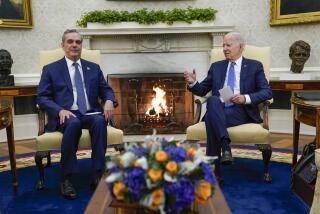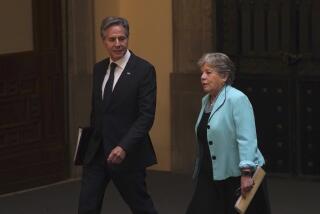THE ECONOMY : Brady Calls for Debt Reduction Plans : Key Role Urged for Banks in Debt Crisis
- Share via
MADRID — The United States told the world’s commercial banks Monday that they had better do their part in providing new loans and debt reduction plans for Mexico and other debtor countries or they will risk jeopardizing the new Third World debt strategy.
At a meeting of international bankers here, Treasury Secretary Nicholas F. Brady noted bluntly that governments and international organizations such as the World Bank had set up all the machinery needed to carry out the new debt plan.
“Now it is time for the commercial banks and debtor nations to seize the opportunity that has been provided,” he said.
Brady made his remarks at the opening session here of the annual International Monetary Conference of the American Bankers Assn., which draws commercial bank executives from all the major industrialized nations.
The secretary’s exhortations are expected to be echoed later this week by officials of the International Monetary Fund, the World Bank and the U.S. Federal Reserve Board, all of whom want the banks to act more swiftly.
Hope to Prod Negotiations
However, Brady’s appeal apparently did not produce many converts Monday. Several leading bankers--particularly those from major European banks--said they had not been persuaded to step up their lending to Third World countries.
After the Brady speech, several of the bankers suggested that new lending might even prove counterproductive by giving debtors who have bad economic records as much relief as those who have tried hard to overhaul their economies.
Brady and the other officials are hoping collectively to prod the banks into completing their negotiations with debtor countries on providing new loans to help finance economic reforms--particularly with Mexico, where the talks have gone at a snail’s pace.
The hint of a possible impasse is worrying officials of both the United States and Mexico. The Bush Administration wants to use Mexico as a model to encourage other debtor countries to participate in the new plan.
At the same time, Mexican officials are becoming apprehensive that they are running out of time politically and need to show progress on the debt front to ward off new protests at home.
President George Bush promised Mexico’s new president, Carlos Salinas de Gortari, last autumn that the United States would support the economic reforms that Salinas and his Administration are trying to put into effect. By any measure, the country is cash-strapped.
U.S. officials say they must have a loan program with Mexico completed by mid-July or the strategy that Brady proposed last March could be in jeopardy. The plan, which seeks to reduce Third World debt burdens, has drawn little enthusiasm outside of the Treasury.
Packages for Other Countries
The strategy, which has become known as the Brady Plan, calls for a broad and voluntary reduction by commercial banks in the current $400 billion in Third World debt outstanding, through negotiations between the banks and the creditor nations.
Besides Mexico, the banks also are negotiating new loan packages with the Philippines and Costa Rica. All three countries have won approval on new loans from the IMF and World Bank, but officials say that more money from banks is needed as well.
The bankers are expected to hear similar messages later this week from Federal Reserve Board Chairman Alan Greenspan, IMF Managing Director Michel Camdessus and World Bank President Barber B. Conable.
Camdessus has already berated the banks once this month, saying at a meeting in Paris last week that they will have to step up their lending sharply. A consortium of banks in New York has been negotiating with Mexico for several weeks in an attempt to hammer out a new loan package, but so far the two sides have remained far apart.
Mexico offered a new proposal Friday but has not received a formal response from the commercial banks. A wage hold-down pact between Salinas and the country’s unions is expected to expire shortly.
Ironically, Brady added a new wrinkle to the debt plan Monday that some say will discourage banks from increasing their lending much at all. He said the interest rate guarantees that the IMF is offering banks to help underwrite debt reduction plans would not apply to any new loans they make.
Treasury officials said later Brady has been delivering the same message to the banks privately for several weeks but that this is the first time he has mentioned it publicly.
More to Read
Get the L.A. Times Politics newsletter
Deeply reported insights into legislation, politics and policy from Sacramento, Washington and beyond. In your inbox twice per week.
You may occasionally receive promotional content from the Los Angeles Times.










